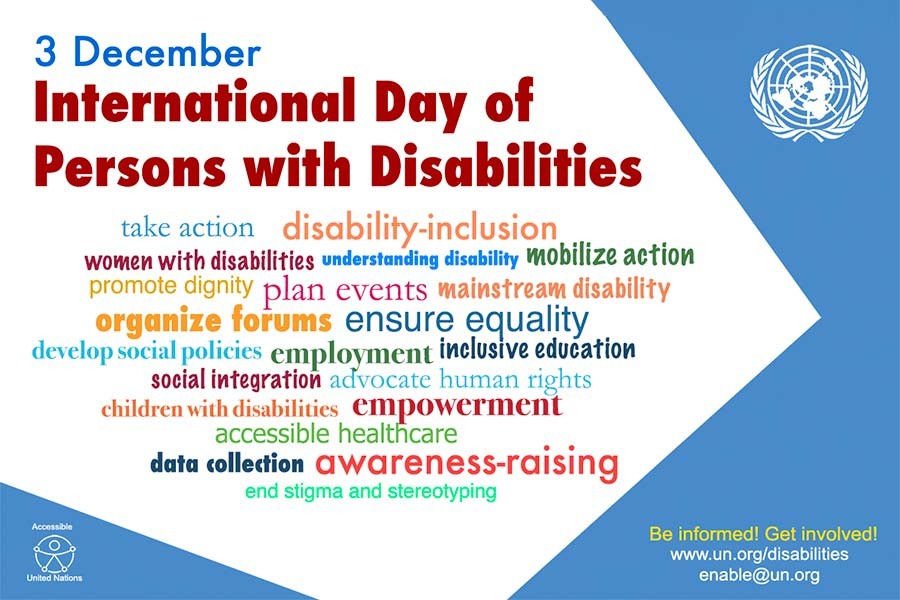Today, December 03 marks the International Day of Persons with Disabilities. The significance of the day as an official UN international observance day is particularly relevant in the context of Bangladesh. According to World Health Organisation (WHO), about 15 per cent of the world's total population suffer some form of disability. The ratio is even higher in the developing countries. WHO studies show that one in every five persons in the developing countries lives with any form of disability. This study makes it clear that Bangladesh is home to a large number of persons living with disabilities. But what is very unfortunate is that there are still little reliable data as to the total number of persons with disabilities in the country.
At present, world population is over 7 billion and more than 1 billion people live with some form of disability. More than 100 million disabled persons are children and 50 per cent of the disabled persons cannot afford health care. In this reality, the International Day for the Persons with Disabilities 2019 is being observed in more than 177 countries around the world that have ratified the UN Convention on the Rights of Persons with Disabilities. The theme of the International Day for the Persons with Disabilities for 2019 is: "Promoting the Participation of Persons with Disabilities and Their Leadership: Taking Action on the 2030 Development Agenda." The theme of this year puts special emphasis on the empowerment of persons with disabilities for inclusive, equitable and sustainable development as envisaged in the Sustainable Development Goals (SDGs), which pledge to 'leave no one behind' and recognise disability as a cross cutting-cutting issue to be considered in the implementation of its 17 goals.
The United Nations defines disability as a condition judged to be significantly impaired related to the usual standard of an individual. Disability includes physical impairment, sensory impairment, cognitive impairment, intellectual impairment, mental illness, and various types of chronic diseases. Disability is a normal part of human diversity and may be permanent, temporary or fluctuating, and may have a minimal or substantial impact on a person's life. Disability may impact mobility, learning or communication and can result from accident, illness or genetic conditions. As per the Rights and Protection of the Persons with Disabilities Act, 2013, enacted by the government of Bangladesh, there are eleven types of disabilities, namely -- autism or autism spectrum disorder, mental illness leading to disability, visual disability, hearing disability, blindness, cerebral palsy, physical disability, speech disability, intellectual disability, down syndrome, and multiple disability.
It is very important to note that Bangladesh has a large population with 34 per cent aged 15 and younger and just 5 per cent aged 65 and older. At present, more than 65 per cent of our population is of working age, between 15 and 64. Such high potential growth in the labour market encourage the disabled people of our society to engage themselves in different economic activities and contribute to the economic wellbeing of the country. However, it is a matter of regret that up until today, persons with disability are discriminated against in respect of civic rights like joining the workforce, joining popular mainstream activities or even social services. Generally, most of the persons with disability coming from the poor economic background of the society struggle a lot to make their place in society to enjoy the basic human rights to economic and social empowerment. Moreover, persons with disability are often subjected to discrimination and negative attitudes. As a result, they live in an unfriendly and hostile environment. They encounter non-cooperation, ill treatment, neglect and hostility at the family, community, society and government levels.
Although many people with disability have some forms of special skills or knowledge, employment opportunities for them are limited. Physical accessibility to the workplaces and indoor facilities are important for effective inclusion of persons with disabilities into employment and ensuring equal rights. So far, very little has been achieved in Bangladesh with regard to employment, vocational training and income generating activities for persons with disabilities. People with disabilities are not given the opportunity to qualify for employment through formal education at higher levels. There is a public sector employment quota of 10 per cent for persons with disabilities, but actual employment rates are low. Apart from the government sector, there is the potential for private sector to do more to improve the employment situation of persons with disabilities.
Bangladesh has become one of Asia's most remarkable success stories in the recent years. According to International Monetary Fund, Bangladesh is among the three fastest growing economies in the world. Furthermore, a report published by HSBC Global Research shows, Bangladesh will be a $700 billion economy in 2030 from $300 billion now. In order to become an upper middle-income country by 2030 and a developed country by 2041, Bangladesh will require huge investments in physical capital, human capital, and innovation enabled by reforms in areas such as financial sector, business regulations and infrastructure. There would be huge demand of human resources in the readymade garments sector, information and communication technology, agro-food processing, light engineering, and retail trade sectors. Inclusion of persons with disabilities in the economic activities in those sectors will play a significant role in the development journey of Bangladesh only if the policymakers of the country realise it and act accordingly.
To emerge as a developed country, Bangladesh needs to develop the status of a huge number of people with disabilities living in the country. Steps must be taken to empower them so that these people can directly contribute to the national economy like they do in many countries around the world. Only then, development of the country will be inclusive and meaningful.
Ayon Debnath works at Sightsavers, a UK-based International Non-Governmental Organisation (INGO).


